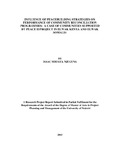| dc.description.abstract | In spite of the heavy investment in peacebuilding and reconciliation programmes in the
horn of Africa by the respective governments, bilateral donors and multilateral agencies,
conflicts continue unabated with loss of lives, livelihoods and injuries and these countries
continue to lag behind in the rankings of the Global Peace Index due to the high
incidences of violent communal conflicts. It is therefore imperative that the peacebuilding
strategies employed are interrogated for their effectiveness else conflicts continue in spite
of the heavy investment in peacebuilding. This research studied the influence of
peacebuilding strategies on the performance of community reconciliation programmes: A
case of communities supported by PEACE II project at Elwak Kenya and Elwak Somalia.
Four peacebuilding strategies that were employed in the PEACE II project at Elwak and
how they influence the performance of community reconciliation programmes were
studied; trauma healing of divided communities, construction of peace dividend projects,
drafting and signing of community peace agreements and capacity development of
peacebuilding management structures. Empirical literature of the works of widely
published scholars was reviewed in the study and the gaps in literature documented. The
study was grounded on the Organization for Economic Cooperation and Development
(OECD) peacebuilding model and John Paul Lederach Peacebuilding Framework as the
key theoretical models. The study adopted a descriptive survey design with a target
population of 113 individuals who had substantial involvement in the PEACE II project
implementation in Elwak. Stratified sampling was used to select the sample size of 88
respondents from the target population. A six level data collection questionnaire of
structured questions with a 5-point Likert scale was used in data collection. Reliability of
the questionnaire was tested using the split-half method which yielded a score of 0.972.
Content and construct validity were determined through review of the data collection
questionnaire by peacebuilding professionals and practitioners to ascertain that it was
comprehensive for the proposed study. Pilot testing was conducted with twelve
respondents who were not included in the final survey. Data collected was cleaned,
coded, categorised and analysed using SPSS software version 19.It was established that
all the four peacebuilding strategies studied had a positive correlation on the performance
of community reconciliation programmes which was significant at 95% confidence with
p values of 0.0005<0.05 and Spearman’s correlation coefficient of 0.401, 0.0009<0.05
and 0.384, 0.0002<0.05 and 0.425 and 0.000<0.05 and 0.585 for trauma healing, peace
dividends, community peace agreements and capacity development of peacebuilding
management structures respectively. All the four null hypotheses tested in the study were
thereforerejected. It was concluded that all the four peacebuilding strategies influence the
performance of community reconciliation programmes at Elwak region with trauma
healing fostering forgiveness and trust building, peace dividends leading to increased
interactions and better understanding of each other, CPAs offering reparations and
preventing revenge attacks and capacity development equipping the local peacebuilding
management structures with capacities for peace. The study recommends that future
community reconciliation programmes in the region should embrace not just one of these
strategies but all of them as they influence community reconciliation to different extents.
It is further recommended that donor agencies funding peacebuilding programmes should
ensure that a component of capacity development of local peacebuilding management
structures is included as it highly influences performance of community reconciliation. | en_US |

